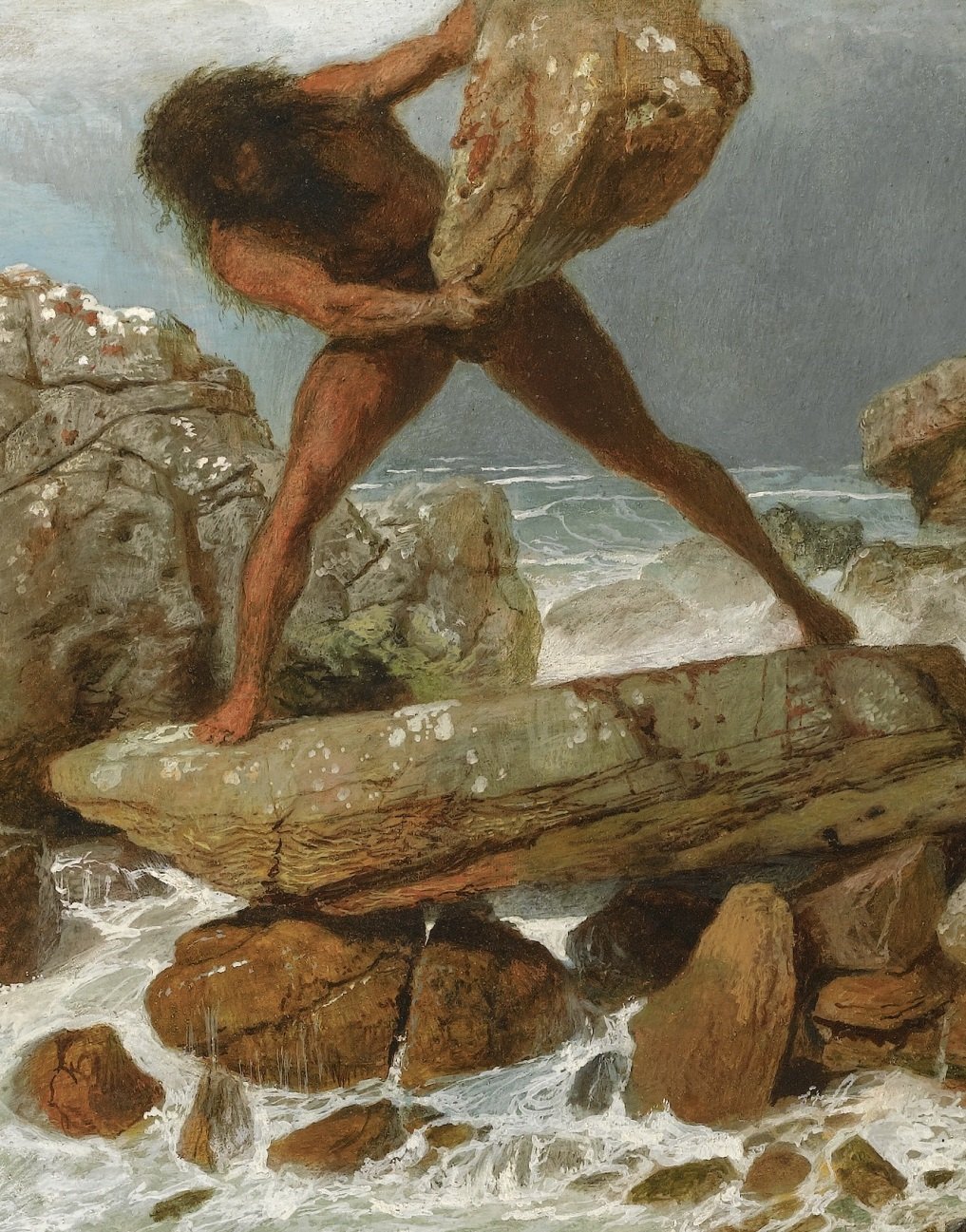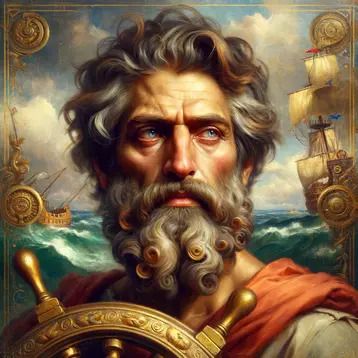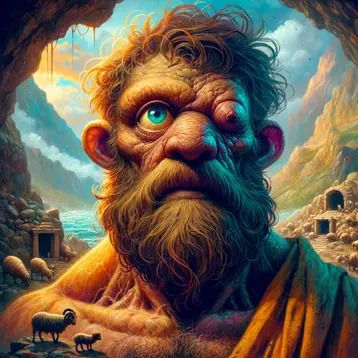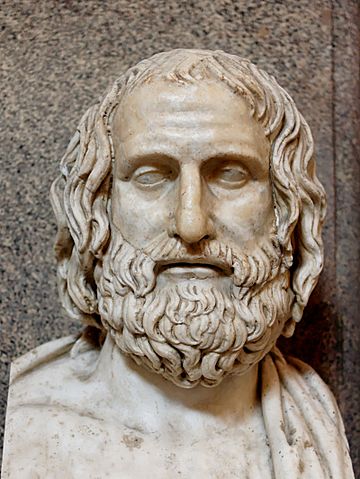
Cyclops
Cyclops by Euripides
A parody of the ninth book of Homer’s Odyssey, Euripides’ Cyclops is the only satyr play—a sort of a tragicomedy performed right after the tragic trilogy at the City Dionysia competitions—to have reached us in its entirety. It begins with Silenus, the eldest of the satyrs, recounting how, years ago, he and his satyrs were shipwrecked while searching for Dionysus and have been forced to serve as shepherds for the Cyclops ever since. Soon after, Odysseus and his sailors arrive, and offer Silenus to trade their wine for food. Silenus cannot resist the offer—after all, he is a servant of Dionysus—even though he has no food to give in return for the wine. So, he offers them some food from the Cyclops’ storeroom. When one of the Cyclopes, Polyphemus, interrupts the deal, Silenus is quick to accuse the guests of stealing his food. Odysseus tries to reason with the Cyclops, but his appeals to morality and justice fall on deaf ears: Polyphemus disavows any fear for the gods—proclaiming his stomach “the greatest of all deities—and argues in favor of pleasure, wealth and personal advantage. The discussion ends with Polyphemus taking Odysseus and his men inside his cave, from which Odysseus manages to steal away for a few moments only so that he could describe to the satyrs the murder of two of his sailors and to ask for their help in binding the Cyclops now that he is drunk. There is no time for that, though, as the drunken Polyphemus heaves outside the cave and takes Silenus inside it be his bed-mate. In the meantime, he has a discussion with Odysseus, during which he makes inquiries about his name. Odysseus tells him that his name is “Outis” which in Greek means “Nobody.” Later on, after Odysseus goes inside the cave and enacts the last part of his plan—the blinding of Polyphemus—this proves as an ingenious stratagem: no matter how much the Cyclops is screaming that “nobody has blinded him,” no alarms are raised since it sounds as if he’s saying that nothing’s wrong with him. Odysseus uses the confusion to flee with the rest of his men and the satyrs. When, at the end of the play, Odysseus reveals his true name, Polyphemus realizes that an ancient oracle has come true and rushes to the mountain peak to sink his enemy’s departing ship with a boulder.
Date and Historical Background
Although the year of the first performance of Cyclops is not known, scholarly consensus dates it back to the City Dionysia festival of 408 BC, which would make the satyr play a companion piece to Orestes. However, with almost as much confidence, 425 BC has also been suggested as a probable date.
Characters and Setting
Characters
• Odysseus, the most cunning of all Greek heroes under Troy, on his journey back to Ithaca
• Polyphemus, the Cyclops from the title, a one-eyed monster living beneath Mount Aetna
• Silenus, the eldest of the satyrs, in forced servitude to the Cyclops
• Chorus of satyrs, children of Silenus and shepherds of the Cyclopes
Setting
The play is set in front of the cave of the Cyclops beneath Mt. Aetna on Sicily, soon after the sack of Troy.
Summary of Cyclops
Prologue
In the opening monologue of the play, Silenus blames his guardian-god Dionysus for having caused him numberless troubles in his life, first when he was driven mad by Hera (as revenge for Zeus’ infidelity with Semele), then when he fought in the Gigantomachy, and finally, when he was kidnapped by Etruscan pirates. Silenus and his children, the satyrs, tried to help him, but were instead shipwrecked on Sicily, “near this crag of Aetna, where Poseidon’s one-eyed sons, the man-slaying Cyclopes, dwell in their remote caves.” One of these Cyclopes, a monster named Polyphemus, caught the satires and forced them to become his shepherds, giving Silenus the job of guarding his cave, filling the watering-troughs, sweeping the house, and assisting the godless Cyclops in his “unholy meals.”
Parodos (Entrance Song)
The Chorus of satyrs enters driving the flock and takes up Silenus’ melancholic lament, mourning the absence of Dionysus and the Maenads and cursing the day when they were forced to swap their revels and wines for Polyphemus’ sheep. “No Dionysus is here,” the leader of the Chorus sings, “no dances, no Bacchic worship and carrying his wand, no ecstatic noise of drums by the gushing springs of water, no fresh drops of wine… Instead we serve this one-eyed Cyclops, slaves in exile, dressed in these wretched goat-skin cloaks and deprived of Dionysus’ friendship.”
First Episode
As soon as he sees men disembarking on the coast, Silenus interrupts the satyrs—who are, in fact, his children—and orders them to drive the flocks into the rocky cave. After the leader of the crew reveals his identity, Silenus immediately recognizes him as “the wheedling chatterer.” The two engage in a brief discussion during which Odysseus asks Silenus a few questions concerning the island and its inhabitants. Silenus tells him everything: firstly, that other than the satyrs, the only residents of the island are the Cyclopes, and secondly, that they are not only inhospitable, but also feast on men. “Do they possess Dionysus' drink, that flows from the vine?” asks the desperate Odysseus. “Not at all!” replies Silenus, suddenly in jubilant mood. “Hence the land they dwell in knows no dancing.” Odysseus sees this as an opportunity to trade some of his wine for the island’s milk, cheese and meat. Silenus is more than happy with the deal and goes to gather some sheep and take cheese out of Polyphemus’ larders—even though he doesn’t own any of the island’s food. In his absence, the satyr Chorus asks Odysseus obscene questions about Helen, but the discussion is interrupted soon by the return of Silenus, who almost immediately advises Odysseus to run away since he has seen the Cyclops coming their way. He refuses, opting instead to hide from view in the vicinity of the cave.
Polyphemus arrives and, after reprimanding the panicky satyrs for being too irresponsible and unreliable, suddenly notices the cowering Silenus near his house. It doesn’t take long for Silenus to give up Odysseus and his crew—without giving away their real identities—fabricating a tale, right there and then, in which he portrays himself as a dependable defender of Polyphemus’ possessions from a bunch of foreign thieves. Odysseus, stepping out of his hiding place, begs to differ: “Cyclops,” he tells Polyphemus, “listen in turn to us strangers as well. We came from our ship to the neighborhood of your cave wishing to buy food. And this fellow, since he had got something to drink, sold and tendered us these sheep for a cup of wine, willingly and to willing customers.” Polyphemus isn’t interested in Odysseus’ explanations, claiming that Silenus is more reliable and more honest than Rhadamanthys, the judge of the Underworld. After learning from Odysseus that he is on his way home from a ten-year war under Troy, he laughs away the expedition as a “disgraceful” one, noting that there aren’t many things more absurd than sailing to Ilium for the sake of one woman.
Be that as it may, Odysseus replies, it was this war that saved Greece from barbarian invasion, and, thus, Poseidon’s temples from destruction (Poseidon is the father of Polyphemus). In addition, he claims that, as a shipwrecked sailor, he deserves hospitality from the Cyclops, this being one of the things Zeus cares about most. Finally, he says that just too many Greek lives have already been lost at Troy, and it would be grievous and unfortunate to leave even more women widowed now that the war is finally over. Polyphemus is, once again, not impressed. As far as he is concerned, there is no greater divinity than one’s stomach, and “to guzzle and eat day by day and to give oneself no pain—this is Zeus in the eyes of men of sense.” That’s why, he concludes, he sacrifices to no one but himself and his belly, and he wouldn’t want to make an exception in this case. As for hospitality, he will make sure to give Odysseus and his crew shelter and water: the cauldron in which he will cook them. Terrified, Odysseus prays to Athena and to Zeus, bemoaning the fact that, after surviving Troy and the sea, he is destined to become the food of a godless man.
As Polyphemus leads everybody but the satyrs in his cave, in the first stasimon, the Chorus describes his gory meals, and express its sincerest wish to never become one of them.
Second Episode
Some time later, Odysseus reemerges from the cave, terrified and in panic. “O Zeus,” he shouts, “what am I to say when I have seen in the cave terrible things, incredible things such as one meets only in stories, not in the deeds of mortals?” The satyrs start asking questions and Odysseus answers them one by one. All together, they paint a gruesome picture: the Cyclops casually killed, cooked, and consumed two of Odysseus’ sailors, leaving everybody else “pale and bloodless.” Fortunately, it was then that Odysseus was “struck with a heaven-sent thought”: to get Polyphemus drunk on wine, something that he remembered (from his discussion with Silenus) that the Cyclops had never tasted before. The plan worked, and Odysseus used the Cyclops’ merry mood (he started singing and dancing) to creep outside and ask the satyrs for some help. If they agree to lend him a hand, Odysseus promises, he will take them off Sicily. The satyrs agree and, soon after, a plan crystalizes out of the discussion between them and Odysseus: to wait until the Cyclops has fallen asleep and burn out his eye.
As soon as Odysseus returns in the cave, the satyrs start discussing their roles in the second stasimon, but are interrupted by the Cyclops who goes out of the cave singing drunkenly and off key. Realizing that their whole plan is in danger, the satyrs attempt to move the Cyclops back into the cave, telling him that “a slender nymph” awaits him there.
Third Episode
However, the Cyclops remains outside, so Odysseus comes out of the cave. He offers him some more wine, which is the perfect cue for Silenus’ reappearance as well: he suggests to be the pourer, but his real intention is to use the position to drink more wine himself. Polyphemus admonishes him after noticing one of his tricks, and asks Odysseus his name. “Nobody,” he replies, using a variant of his name with that meaning (“Outis” is similar in Greek to Odysseus and it means “Nobody”). The Cyclops promises to remember the sailor’s name and eat him last, before ordering him to be his wine-pourer because his current one has proven to be a crook. A few glasses later, the Cyclops has already started seeing things that aren’t there, and confusing Silenus for Ganymede and himself for Zeus, takes the eldest satyr inside the cave to be his bed-mate. Odysseus follows them.
Left alone in front of the cave, in the third stasimon of the play, the satyrs anticipate the blinding of Polyphemus and joyfully sing of returning to Dionysus yet again.
Fourth Episode
“Silence, you savages, for heaven's sake be quiet!” cries Odysseus exiting the cave once again. “Let your lips be shut fast! I forbid anyone even to breathe or to blink or to clear his throat lest the monster wake up before the Cyclops' eye can have its contest with the fire.” After reprimanding them, Odysseus starts delegating them responsibilities, but, one by one, they withdraw, feigning injuries. Odysseus realizes that he must depend on his crew and goes back inside the cave.
Not much time passes before Polyphemus exits the cave, blinded and in gruesome pain. “Nobody destroyed me,” he starts shouting, “Nobody has blinded my eye.” The satyrs mock the absurdity of these cries and use his blindness to play around with him, leading him in the direction of a rock cliff—with which the Cyclops collides—rather than in that of Odysseus. In the meantime, Odysseus and the surviving members of his crew reach the ship, and Odysseus proudly reveals his identity to Polyphemus. Once he hears his real name, the Cyclops realizes that an oracle has been fulfilled, and warns Odysseus that the same prophecy states that as a punishment for this blinding, he will have to wander for many years. Odysseus scoffs away the prophecy and heads homeward, while Polyphemus promises to hurl a crag in his direction. The play ends with the satyrs—now aboard Odysseus’ ship—revealing, once again, their desire to return to serving Dionysus.
A Brief Analysis
Unfortunately, Cyclops is the only complete satyr play that has reached us, and we don’t really know how different or similar it might have been to other works in the genre. It is, however, obvious from its content that, though comparable in structure to the tragedies, it is pretty unlike it in at least a few aspects: 1) its length (it’s about half that of an average tragedy); 2) its bawdiness and obscenity; 3) its parodic treatment of heroic topics; 4) its insistence to use satyrs as the Chorus (hence, the name). It is this last trait that most obviously defines the genre, since the very presence of the jovial followers of Dionysus in any play can be expected to lead to lewd and hilarious events. However, Cyclops has proven to be more interesting to interpreters in the way it compares three different worlds—that of civilized god-abiding humanity (represented by Odysseus), the anti-world of the satyrs who concede reverence only in the most irreverent god Dionysus, and the brutal and savage world of Polyphemus who puts himself first and asserts that his belly is “the greatest of all divinities.” Odysseus does come off best at the end, but even he is not without flaws and self-doubt. And perhaps that’s why tetralogies ended with a satyr play: unlike the three trilogies, at least based on this example, satyr plays seem much more liberating, based in reality and even relatable.
Cyclops Sources
There are many translations of Cyclops available online, both in verse and in prose; if you are a fan of the latter, you can read David Kovacs’ translation for Loeb Classical Library here. If, however, you prefer poetry, feel free to delve into Arthur S. Way blank verse adaptation here.
See Also: Polyphemus, Odysseus, Silenus, Euripides
Cyclops Video
Cyclops Associations
Link/Cite Cyclops Page
Written by: The Editors of GreekMythology.com. GreekMythology.com editors write, review and revise subject areas in which they have extensive knowledge based on their working experience or advanced studies.
For MLA style citation use: GreekMythology.com, The Editors of Website. "Cyclops". GreekMythology.com Website, 30 Jan. 2020, https://www.greekmythology.com/Plays/Euripides/Cyclops/cyclops.html. Accessed 25 April 2024.




